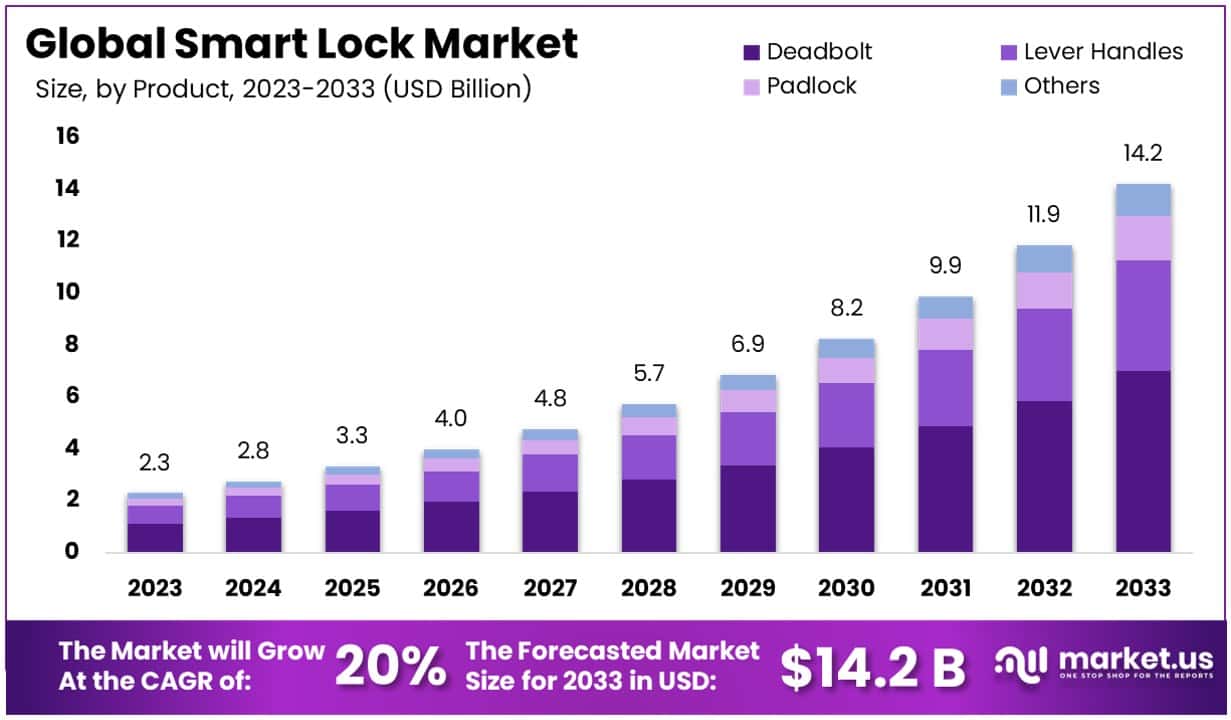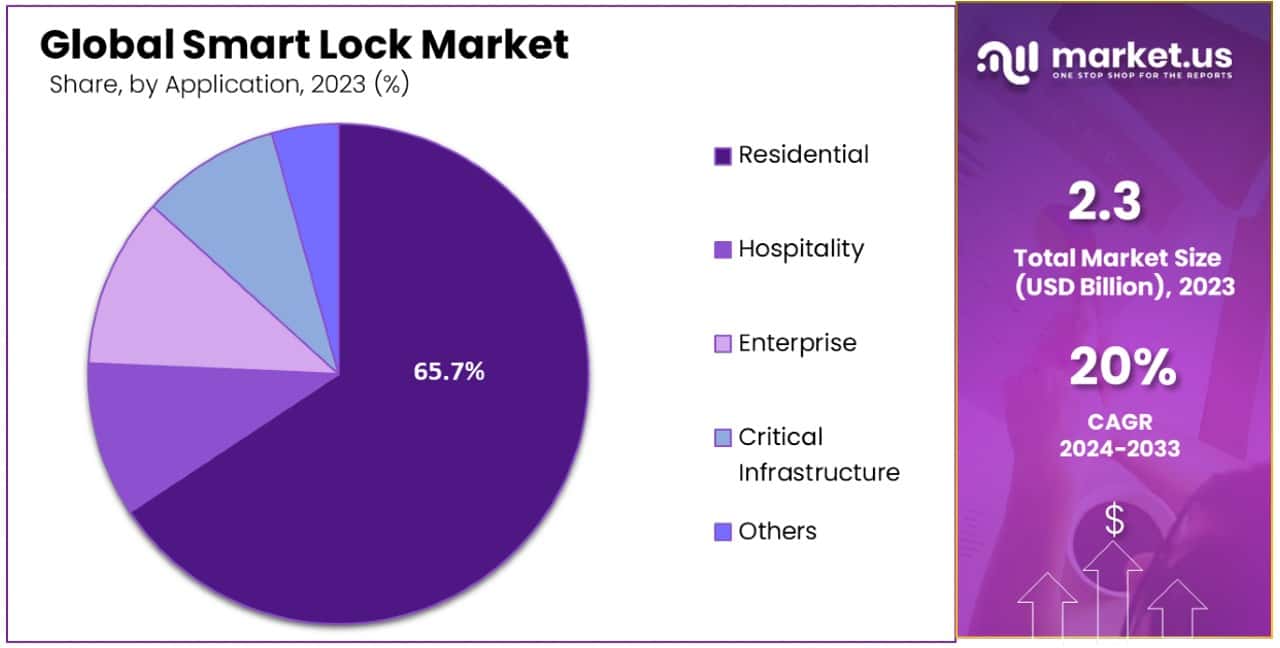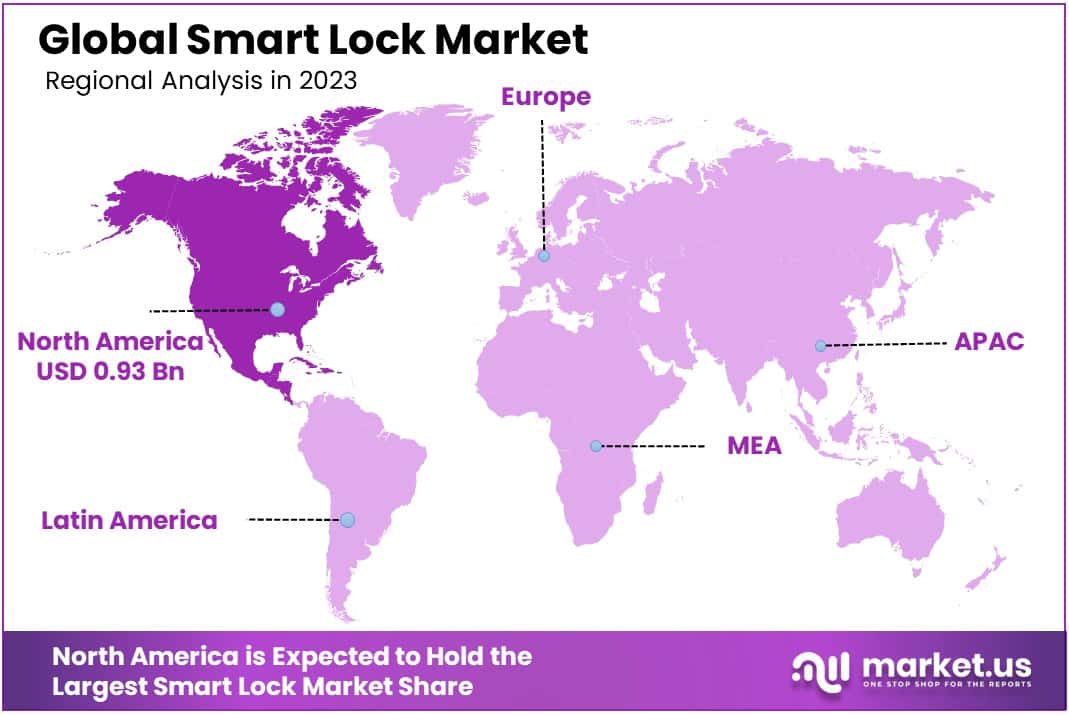Global Smart Lock Market By Type(Deadbolt, Lever Handles, Padlock, Others), By Application (Residential, Hospitality, Enterprise, Critical Infrastructure, Others), Region and Companies - Industry Segment Outlook, Market Assessment, Competition Scenario, Trends and Forecast 2024-2033
- Published date: September 2024
- Report ID: 29356
- Number of Pages: 268
- Format:
-
keyboard_arrow_up
Quick Navigation
Report Overview
The Global Smart Lock Market is expected to be worth around USD 14.2 billion by 2033, up from USD 2.3 billion in 2023, growing at a CAGR of 20.0% during the forecast period from 2024 to 2033. North America dominated a 40.8% market share in 2023 and held USD 0.93 Billion in revenue from the Smart Lock Market.
A smart lock is an electromechanical locking device that allows users to open and close doors via authentication methods that are considered more secure than traditional keys. These methods include digital keypads, biometric identification, remote unlocking through smartphones or voice commands, and connectivity to smart home systems via technologies like Bluetooth, Wi-Fi, or Z-Wave.
The Smart Lock Market encompasses the production, distribution, and sales of smart locking systems that are integrated into residential, commercial, and industrial properties. This market is driven by the rising adoption of smart home technology, increasing emphasis on home security, and the convenience offered by keyless operations.
One major growth factor for the Smart Lock Market is the surge in smart home automation, which integrates security features like smart locks into a centralized control system, enhancing user convenience and safety. The expanding IoT ecosystem further accelerates this integration, making smart locks an integral part of modern automated homes.

The demand for smart locks is bolstered by heightened security concerns among homeowners and businesses. As incidences of break-ins and theft rise, more consumers are turning to smart locks for their advanced security features such as access logs, tamper alerts, and the ability to remotely control and monitor entry points.
The Smart Lock Market is undergoing a transformative phase, catalyzed by substantial investments and supportive policies from both governmental and private sectors. Initiatives such as the SMART Grants Program, as delineated by transportation.gov, have allocated $100 million annually from the Bipartisan Infrastructure Law for the years 2022-2026.
This funding aims to advance smart community technologies in transportation, including security enhancements like smart locks. Such governmental support underscores a robust commitment to integrating advanced technology into everyday infrastructure, potentially accelerating the adoption of smart locks across various sectors.
Further bolstering this growth trajectory is the strategic investment by regional governments in startups focused on smart technology. According to entrackr.com, the Karnataka government’s establishment of the KARMSEVAN Fund exemplifies such initiatives.
This fund, with investments in firms like OpenApp, which notably raised $1.3 million in pre-Series A funding, is poised to invigorate the local technology ecosystem. OpenApp’s commitment to channeling substantial funds into marketing and product development reflects a broader trend of smart lock companies aligning with governmental goals to enhance local technological capabilities and market penetration, as reported by vccircle.com.
These developments suggest a favorable market environment for smart lock technologies, characterized by supportive policies, financial backing, and a focus on innovative applications. The concerted efforts of both government and private sectors are likely to propel significant growth in the smart lock market, with enhanced market reach and technological sophistication.
Key Takeaways
- The Global Smart Lock Market is expected to be worth around USD 14.2 billion by 2033, up from USD 2.3 billion in 2023, growing at a CAGR of 20.0% during the forecast period from 2024 to 2033.
- In 2023, Deadbolt held a dominant market position in the By Type segment of the Smart Lock Market, with a 49.2% share.
- In 2023, Residential held a dominant market position in the By Application segment of the Smart Lock Market, with a 65.7% share.
- North America dominated a 40.8% market share in 2023 and held USD 0.93 Billion in revenue from the Smart Lock Market.
By Type Analysis
In 2023, Deadbolt held a dominant market position in the By Type segment of the Smart Lock Market, commanding a 49.2% share. This segment’s prominence is attributed to the high reliability and security associated with deadbolt locks, which are widely preferred in residential and commercial settings for their robustness against forced entry.
Following deadbolts, Lever Handles captured a significant portion of the market. These locks are favored for their ease of use and accessibility, making them particularly popular in commercial buildings where compliance with accessibility standards is a must.
Padlocks also maintained a noticeable share. Their portability and versatility make them ideal for securing a variety of assets, from residential gates to private lockers in public spaces, appealing to a broad consumer base.
The Others category, which includes less common types such as smart cylinders and rim latches. While smaller in comparison, this segment caters to niche markets that prioritize specific functionalities or aesthetic preferences.
Overall, the diverse preferences within the Smart Lock Market highlight the varied security needs and applications across different sectors, driving the development and adoption of tailored smart lock solutions.
By Application Analysis
In 2023, Residential held a dominant market position in the By Application segment of the Smart Lock Market, with a 65.7% share. The substantial adoption in this segment is driven by increasing consumer awareness and preference for enhanced home security solutions, coupled with the integration of smart home technologies.
Hospitality followed, securing a notable share of the market. Hotels and other lodging facilities are rapidly adopting smart locks to offer enhanced security and streamlined access controls, improving guest experience and operational efficiency.
Enterprise applications also captured a significant portion of the market. Businesses are implementing smart locks to safeguard sensitive areas and streamline access management, reflecting a growing emphasis on security and technological integration in corporate environments.
Critical Infrastructure contributed to the market, where the adoption of smart locks is essential for securing high-risk and restricted areas and crucial for maintaining the integrity and security of national and regional assets.
The Others category, which includes educational institutions, government buildings, and healthcare facilities. This segment is expected to grow as these institutions increasingly recognize the importance of security innovations in maintaining safe and secure environments.
Overall, the Smart Lock Market is expanding across various applications, driven by security needs and the benefits of integrating advanced technologies into traditional lock systems.

Key Market Segments
By Type
- Deadbolt
- Lever Handles
- Padlock
- Others
By Application
- Residential
- Hospitality
- Enterprise
- Critical Infrastructure
- Others
Drivers
Smart Lock Market Growth Factors
The Smart Lock Market is experiencing significant growth due to several key drivers. Firstly, the increasing focus on home security, spurred by rising urbanization and technological advancements, is pushing more consumers to adopt smart lock systems.
These systems offer enhanced security features like remote access, real-time alerts, and integration with other smart home devices, appealing to tech-savvy homeowners. Secondly, the growing penetration of smartphones and internet connectivity allows users to control and monitor their locks from anywhere, adding a layer of convenience and control that traditional locks cannot match.
Additionally, government initiatives and funding in smart infrastructure development are supporting the adoption of these technologies in the public as well as private sectors. This combination of heightened security concerns, technological integration, and supportive government policies is driving the widespread adoption of smart locks in residential and commercial properties.
Restraint
Challenges Facing Smart Lock Adoption
Despite the growing market for smart locks, several restraints hinder their widespread adoption. One significant challenge is the high cost associated with these advanced security devices, which can deter budget-conscious consumers and small businesses from investing in them.
Additionally, concerns about digital security persist; potential vulnerabilities in software and the risk of hacking can make users hesitant to transition from traditional mechanical locks to smart lock systems. The complexity of installing and maintaining these devices also poses a barrier, especially for those who are not technologically adept.
Furthermore, the dependence on electricity and internet connectivity means that in the event of power or network outages, access control could be compromised, raising reliability issues. These factors collectively slow down the market penetration of smart locks, as consumers weigh the benefits against the potential risks and costs.
Opportunities
Expanding Opportunities in Smart Locks
The Smart Lock Market presents expansive opportunities driven by evolving consumer behaviors and technological advancements. As more people embrace smart home technologies, there is a rising demand for integrated security solutions like smart locks that offer convenience and enhanced control.
This trend is further supported by the growth of the Internet of Things (IoT), where smart locks can easily integrate with other devices for a more interconnected and automated home environment. Additionally, the push towards rental and shared economy models, such as Airbnb and office sharing spaces, creates a need for more flexible, secure access solutions, which smart locks provide.
These locks enable easy access management remotely, making them ideal for property managers and homeowners who engage in such rental activities. The increasing recognition of these benefits is expected to drive continued growth and innovation within the smart lock market.
Challenges
Navigating Smart Lock Market Challenges
The Smart Lock Market faces several challenges that could impede its growth. A primary concern is the apprehension regarding data privacy and security. As smart locks operate on digital platforms, there’s a potential risk of personal data breaches and unauthorized access, which makes some consumers cautious.
Technological complexity also stands as a hurdle; the need for continuous software updates and compatibility with various operating systems can intimidate non-tech-savvy users. Additionally, the initial setup and ongoing maintenance require a level of technical knowledge that might not be present in all user demographics.
Reliability issues such as dependency on stable internet connections and power supply further complicate the use of smart locks, especially in regions with frequent infrastructure disruptions. Addressing these challenges effectively is crucial for the market to maximize its growth potential and consumer trust.
Growth Factors
Key Growth Drivers for Smart Locks
The Smart Lock Market is poised for substantial growth, fueled by several pivotal factors. The increasing consumer demand for enhanced home security, driven by rising crime rates and heightened safety consciousness, is a significant growth driver.
As smart locks offer advanced features like remote access, real-time monitoring, and integration with home automation systems, they attract a broad consumer base looking for modern security solutions. Additionally, technological advancements in IoT and mobile connectivity facilitate the seamless operation of smart locks, making them more accessible and user-friendly.
The expanding real estate sector and the surge in home renovation projects also contribute to the adoption of these devices. Moreover, government initiatives promoting smart cities and connected infrastructure provide further impetus for the growth of the smart lock industry, positioning it as a critical component of future urban development.
Emerging Trends
Emerging Trends in Smart Locks
Emerging trends in the Smart Lock Market are reshaping how users approach home and facility security. A significant trend is the integration of smart locks with home automation and IoT devices, enabling users to control locks using smartphones, voice commands, or even remotely through internet connectivity.
This integration enhances user convenience and security, allowing for real-time notifications and the ability to grant or revoke access from anywhere. Another trend is the increasing adoption of biometric technology systems in smart locks, such as fingerprint recognition and facial recognition, which add an extra layer of security by personalizing access.
Additionally, the rise in partnerships between smart lock manufacturers and home security service providers is creating comprehensive security solutions for consumers. These collaborations ensure that smart locks are not standalone devices but part of a broader, more integrated home security system, driving further market growth.
Regional Analysis
The Smart Lock Market exhibits distinct regional dynamics, with North America dominating the sector, holding a 40.8% market share and generating revenues of USD 0.93 billion. This region leads due to high consumer awareness, robust technological infrastructure, and significant investments in smart home technologies. In North America, the emphasis on security and the rapid adoption of IoT devices are key growth drivers.
Europe follows, with a strong focus on innovation and security, especially in urban areas that are integrating smart city technologies. The region’s stringent regulations on data protection also push for advanced security features in smart locks, enhancing market penetration.
Asia Pacific is experiencing the fastest growth due to rising urbanization, increasing income levels, and expanding real estate developments, particularly in China and India. This region’s market is driven by a growing middle class and a significant shift towards smart technology in residential and commercial properties.
The Middle East & Africa and Latin America are gradually adopting smart lock technologies. Growth in these regions is fueled by increasing public and private security expenditures and a growing awareness of advanced security technologies, although at a slower pace compared to other regions. Overall, while North America currently leads, Asia Pacific is expected to witness rapid market expansion in the coming years.

Key Regions and Countries
- North America
- US
- Canada
- Europe
- Germany
- France
- The UK
- Spain
- Italy
- Rest of Europe
- Asia Pacific
- China
- Japan
- South Korea
- India
- Australia
- Rest of APAC
- Latin America
- Brazil
- Mexico
- Rest of Latin America
- Middle East & Africa
- South Africa
- Saudi Arabia
- UAE
- Rest of MEA
Key Players Analysis
In the global Smart Lock Market, key players such as August Home, Inc. (a subsidiary of ASSA ABLOY), Avent Security, and Cansec Systems Ltd. are pivotal in shaping the industry dynamics in 2023.
August Home, Inc., under the umbrella of ASSA ABLOY, continues to be a prominent leader in the market. The company benefits from ASSA ABLOY’s extensive distribution network and strong brand reputation, which enhances the visibility and adoption of August’s smart lock products.
August Home’s innovative solutions, which focus on seamless integration with other smart home devices and user-friendly interfaces, cater to a tech-savvy consumer base looking for reliable and advanced home security options. Their commitment to continual technology upgrades and compatibility with existing home automation systems reinforces their market position.
Avent Security, known for its robust and durable security products, focuses on leveraging technology to enhance the functionality and security features of its smart locks. With a strong emphasis on research and development, Avent Security has successfully maintained its competitive edge by introducing products that are both innovative and aligned with consumer expectations for high-security standards.
Cansec Systems Ltd., although smaller compared to giants like ASSA ABLOY, carves its niche by offering customized solutions tailored to specific customer needs. Their approach to integrating unique features, such as biometric controls and sophisticated access management systems, allows them to cater to a segment of the market that prioritizes specific security enhancements over-generalized solutions.
Top Key Players in the Market
- August Home, Inc. (ASSA ABLOY)
- Avent Security
- Cansec Systems Ltd.
- HavenLock, Inc.
- Kwikset (Spectrum Brands Holdings, Inc.)
- MUL-T-LOCK TECHNOLOGIES LTD. (ASSA ABLOY)
- Schlage (Allegion Plc)
- Zigbang Co., Ltd. (Previously Samsung SDS)
- Sentrilock, LLC
- Smart Locking Logic Proprietary Limited
- UniKey Technologies, Inc.
- Yale Locks (ASSA ABLOY)
- Goji
- Onity Inc. (Carrier Global Corporation)
- Honeywell International Inc.
Recent Developments
- In February 2024, Goji secured $10 million in Series B funding to expand its R&D and marketing strategies. This investment will support the development of next-generation smart locks with advanced connectivity features.
- In June 2023, UniKey Technologies launched a new biometric smart lock, enhancing security features by integrating fingerprint recognition technology. This product aims to target residential markets, focusing on providing users with quicker and safer access.
- In March 2023, Yale introduced its latest smart lock series that includes Wi-Fi connectivity and enhanced encryption, ensuring greater security and ease of use for homeowners.
Report Scope
Report Features Description Market Value (2023) USD 2.3 Billion Forecast Revenue (2033) USD 14.2 Billion CAGR (2024-2033) 20.0% Base Year for Estimation 2023 Historic Period 2019-2022 Forecast Period 2024-2033 Report Coverage Revenue Forecast, Market Dynamics, Competitive Landscape, Recent Developments Segments Covered By Type(Deadbolt, Lever Handles, Padlock, Others), By Application (Residential, Hospitality, Enterprise, Critical Infrastructure, Others) Regional Analysis North America – US, Canada; Europe – Germany, France, The UK, Spain, Italy, Rest of Europe; Asia Pacific – China, Japan, South Korea, India, Australia, Singapore, Rest of APAC; Latin America – Brazil, Mexico, Rest of Latin America; Middle East & Africa – South Africa, Saudi Arabia, UAE, Rest of MEA Competitive Landscape August Home, Inc. (ASSA ABLOY), Avent Security, Cansec Systems Ltd., HavenLock, Inc., Kwikset (Spectrum Brands Holdings, Inc.), MUL-T-LOCK TECHNOLOGIES LTD. (ASSA ABLOY), Schlage (Allegion Plc), Zigbang Co., Ltd. (Previously Samsung SDS), Sentrilock, LLC, Smart Locking Logic Proprietary Limited, UniKey Technologies, Inc., Yale Locks (ASSA ABLOY), Goji, Onity Inc. (Carrier Global Corporation), Honeywell International Inc. Customization Scope Customization for segments, region/country-level will be provided. Moreover, additional customization can be done based on the requirements. Purchase Options We have three licenses to opt for: Single User License, Multi-User License (Up to 5 Users), Corporate Use License (Unlimited User and Printable PDF) 
-
-
- August Home, Inc. (ASSA ABLOY)
- Avent Security
- Cansec Systems Ltd.
- HavenLock, Inc.
- Kwikset (Spectrum Brands Holdings, Inc.)
- MUL-T-LOCK TECHNOLOGIES LTD. (ASSA ABLOY)
- Schlage (Allegion Plc)
- Zigbang Co., Ltd. (Previously Samsung SDS)
- Sentrilock, LLC
- Smart Locking Logic Proprietary Limited
- UniKey Technologies, Inc.
- Yale Locks (ASSA ABLOY)
- Goji
- Onity Inc. (Carrier Global Corporation)
- Honeywell International Inc.









